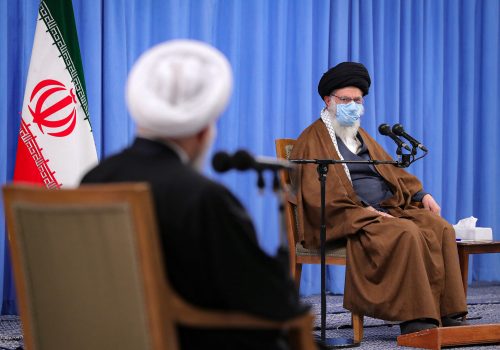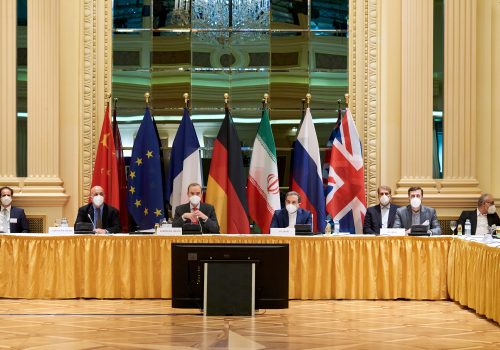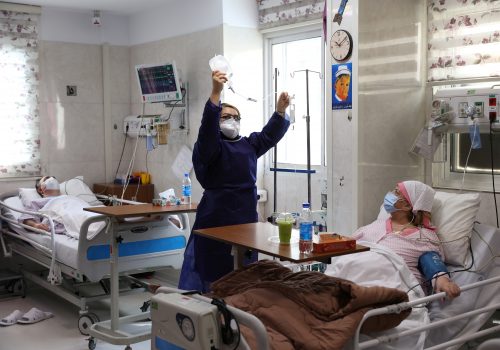Iran said nuclear talks will continue ‘soon.’ But how ‘soon’ is ‘soon’?
The United Nations General Assembly and sideline meetings have ended, and so has Hossein Amirabdollahian’s maiden visit to New York as Iran’s foreign minister. To demonstrably negate views that Iran is diplomatically isolated, the foreign minister routinely tweeted which of his peers he was about to meet—over fifty countries—without divulging any specific details or outcomes of the discussions. Early feedback in Tehran is that the meetings were not as helpful as hoped.
The international community expected to learn more developments on Iran’s thinking under President Ebrahim Raisi and the resumption of nuclear talks, which halted after he was selected in June. There was little news in President Raisi’s pre-recorded sixteen-minute address on September 21, which seemed to have been heavily edited to iron out the Iranian president’s challenge with public speaking. It came shortly after President Biden’s speech, in which he stressed America’s changed focus of using diplomatic persuasion more consistently than its military muscle. President Raisi’s speech covered generalities about Iran’s past glories, its advances in scientific fields, its seventy-year-old grievance about US hegemony and interference in Iran’s domestic matters, schadenfreude over America’s awkward retreat from Afghanistan, prescriptions to resolve regional conflicts, and Iranians’ valiant steadfastness to resist America’s inhumane sanctions reimposed by the Donald Trump administration in 2018.
Similarly, in a series of closed-door sessions and press interviews, Amirabdollahian also avoided sharing any more insights into Iran’s thinking about the Joint Comprehensive Plan of Action (JCPOA) than expected. On September 25, he stated that Iran plans to return to the negotiations “soon” after internal assessments of the nuclear file are completed by the new team, but adding that Iran’s notion of “soon” is different from the West’s “soon.” Two factors may be behind these cryptic comments.
First, Amirabdollahian, despite being foreign minister, is essentially not in charge. The nuclear portfolio has been transferred from Deputy Foreign Minister Abbas Araghchi, former Foreign Minister Mohammad Javad Zarif’s protégé and lead nuclear negotiator in previous rounds of talks, to Ali Bagheri Kani, a 2015 nuclear deal critic. Bagheri Kani is the son of one of the founders of the Islamic Republic and the brother of Supreme Leader Ayatollah Ali Khamenei’s son-in-law, placing him within the center of an increasingly shrinking inner circle.
It was rumored that Bagheri Kani would become foreign minister, but he was instead assigned the Islamic Republic’s most thorny, visible, and consequential foreign policy portfolio. He was a member of the hardliner Saeed Jalili’s negotiating team during President Mahmoud Ahmadinejad’s tenure and reportedly Jalili’s top pick for the position. Though the White House was less than enthused about his appointment, there could be advantages and disadvantages. On the one hand, Bagheri Kani has been against the JCPOA for so long—he once called it a caricature—that it would be difficult to reverse his decision. On the other hand, he is so intensely connected to the nucleus of the hardline decision-making that he will not face headwinds from hardliners should he find a way out. Even if the JCPOA needs approval from parliament, it can be facilitated within the “family,” as even the Speaker of Parliament, Mohammad Bagher Qalibaf, is also the nephew of the Supreme Leader’s wife.
The second and more important reason behind Iran’s wait-and-see approach is how the Biden administration will fare on its internal political front. With declining approval ratings in the wake of the shaky Afghanistan withdrawal in August and challenges inside his own party to pass his signature domestic agenda, Washington watchers in Tehran are not sure how much President Biden will be able to deliver to Iran, should negotiations resume. The chatter in Clubhouse, an audio-only platform that has truly revolutionized dialogue among disparate groups in “rooms” exceeding hundreds of listeners, reflects a growing doubt that America will once again be able to hold up its end of the bargain—the lifting of sanctions—should each side agree to make compromises.
Since the 1979 revolution, Iran has been a favorite political hot potato for Democrats and Republicans—an electorally useful tool to look tough. The unprecedented polarity in Congress and the possibility of what some Clubhouse pundits believe could be a power shift during the 2022 congressional midterms and 2024 presidential elections, indicates that Iran considers it an immensely high-risk gamble to agree to any concessions. As the saying goes, “Once bitten, twice shy.”
The passage of the two infrastructure bills will not only signal that President Biden can control Congress and make things happen, even with wide divisions, but that he can also take bold steps on foreign policy issues, including the nuclear accord. And in Iran, despite the ever-revolutionary slogans of esteghlal (independence), America’s domestic politics is still as decisive a factor in the Islamic Republic’s decision-making as its own internal politics.
Nadereh Chamlou is a nonresident senior fellow at the Atlantic Council and was formerly a senior advisor to the chief economist at the World Bank’s MENA Region. Follow her on Twitter: @nchamlou.
Image: Iran's ambassador to the International Atomic Energy Agency (IAEA) Kazem Gharibabadi talks to Russia's Governor to the IAEA Mikhail Ulyanov before the beginning of a board of governors meeting at the IAEA headquarters in Vienna, Austria September 13, 2021. REUTERS/Leonhard Foeger


